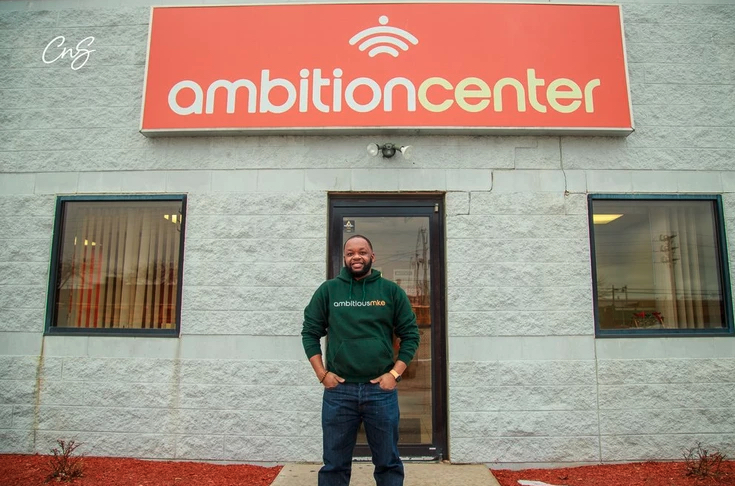Marcell Jackson considers himself lucky.
As a technical project manager with GE Healthcare, he spent years working from home and enjoying the flexibility — and stability — of his full-time job. But once the pandemic struck, even he was feeling the pitfalls of social isolation.
“I’m an extrovert, and I love going to the office,” Jackson told Technical.ly. “I’m more productive in the office.”
Like many remote workers, Jackson often turned to working in cafes and coworking spaces to maintain some kind of social connection. That’s where he noticed a gap: Besides most coworking spaces being located mostly downtown, there just weren’t a whole lot of workers around that looked like him.
The rise of remote work
Nationally, and increasingly, employees are ditching the office. The demand for hybrid positions is growing, too. Around a fifth of high-paying jobs now include remote or flexible work opportunities; before the pandemic, this number floated around 4%. And another 3 million jobs have been moved to fully remote arrangements permanently.
For people of color, the opportunities afforded by remote work arrangements are even more alluring. Slack’s Future Forum found that roughly 97% of Black knowledge workers currently working in hybrid or remote roles wanted to maintain their work arrangements.
The reasons are numerous. With many marginalized professionals navigating white, male-led spaces, the prospect of working remotely is an attractive one, as it offers the opportunity to avoid issues such as code switching, in-person microaggressions, and spending a majority of their workweek in spaces where they might feel culturally misunderstood or alone.
Still, in talking with friends, Jackson said it became clear that working from home wasn’t always an ideal situation for everyone — and even having a home office is a privilege. Many work-from-home employees are “improvising,” he added.
“My friend Mark is a brand strategist, and he says, ‘I’m thinking about logos at my kitchen table, my girlfriend is on the couch, and we have a 5-year-old,’” Jackson explained. “Other friends were working in closets [because they didn’t have other private space]. One friend said he didn’t even open his mouth to speak until his 4 p.m. meeting. It was pretty deep hearing all of their stories.”
Diversifying coworking
Jackson had been toying with the idea of opening a coworking space for underserved entrepreneurs since high school, when he lived near a business park. Like so many others during the pandemic, he decided “it was a now-or-never moment.”
“We’ve been left out of the conversation,” Jackson said of BIPOC entrepreneurs in coworking spaces, which are usually targeted toward wealthier, white professionals and located in downtown hubs. “Not only just the ability to get funding [as an entrepreneur], but just having a physical space which lends more credibility.”
In November 2021, Jackson self-funded and opened Ambition Center MKE at 530 E. Vienna Ave., on Milwaukee’s North Side, to serve BIPOC entrepreneurs, small business owners and other remote professionals. The 3,300-square-foot space includes private offices, conference rooms, a media room and event space.

At Ambition Center MKE. (Courtesy photo)
By Jackson’s count, the center is just one of 56 Black-owned coworking spaces in the country. (Two others: P4 Hub in Philadelphia’s Germantown neighborhood, and The Cube Cowork in Northeast Baltimore.) Besides giving underserved entrepreneurs a shared workspace — the center’s tagline is “Coworking where culture is celebrated” — Jackson has made it his mission to advance the work of Milwaukee’s BIPOC entrepreneurs by connecting them with business resources, workshop training, strategic networking and mentorship opportunities.
The center’s popular workshop series “Collab Corner,” has featured an array of local professional experts covering topics such as business branding, scaling success, business finance and investing, and marketing.
A space for Milwaukee’s BIPOC pros
The importance of representation and inclusivity was something Jackson recognized early on. Growing up on Milwaukee’s North Side, he’d always had a love for “taking things apart and putting them back together.” He recalls a memory that literally “sparked” his interest in engineering.
“I was playing Power Rangers and I stuck the keys in an outlet and saw a blue spark,” Jackson said, laughing. “Of course, I got in trouble. But once I got my computer, I wanted to go fix. If the VCR broke, I would fix it. I became my family’s ‘tech person.’”
But by the time he reached high school and joined the Marquette Upward Bound pre-college program, with a slew of internships, activities and field trips shaping his future career, he still hadn’t met a Black engineer. When he finally did meet one, at the age of 17, he remembers thinking, “Wait, we exist.” After graduation, he made up his mind to leave Milwaukee and attend an HBCU where “Black engineers were celebrated.”
Attending A&T in Greensboro, North Carolina and later living in Pennsylvania and working in Dallas-Fort Worth, Jackson said he was exposed to the potential of Black professionals for the first time.
“I thought, ‘We could do this in Milwaukee,’ as well,” Jackson said.
Back home in Milwaukee, Black-owned businesses continue to be overlooked, Jackson said. He points to MKE Black, a business directory that currently lists over 500 Black-owned businesses in the city — many of which never receive the funding, media coverage, or resources as the city’s white-owned businesses or startups.
“There’s this big gap,” Jackson said. “People aren’t investing in the North Side. But we’re here. Now, it’s all about how we start to push that narrative in the city.”
Watch the full conversation with Ambition Center CEO Marcell Jackson:
Subscribe to This Week in Milwaukee Rising:

This article appears as part of This Week in Milwaukee Rising, a weekly newsletter from Technical.ly highlighting the innovators bringing a more just, equitable and dynamic Milwaukee economy. Subscribe here. The series is underwritten by American Family Insurance Institute for Corporate and Social Impact.
Before you go...
Please consider supporting Technical.ly to keep our independent journalism strong. Unlike most business-focused media outlets, we don’t have a paywall. Instead, we count on your personal and organizational support.
Join our growing Slack community
Join 5,000 tech professionals and entrepreneurs in our community Slack today!





